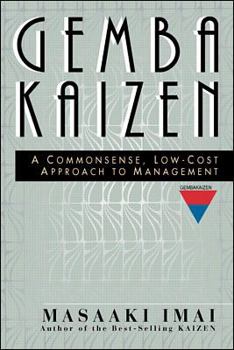Gemba Kaizen: A Commonsense, Low-Cost Approach to Management
Select Format
Select Condition 
Book Overview
Publisher's Note: Products purchased from Third Party sellers are not guaranteed by the publisher for quality, authenticity, or access to any online entitlements included with the product.The... This description may be from another edition of this product.
Format:Hardcover
Language:English
ISBN:0070314462
ISBN13:9780070314467
Release Date:March 1997
Publisher:McGraw-Hill
Length:384 Pages
Weight:1.61 lbs.
Dimensions:1.2" x 6.3" x 9.3"
Customer Reviews
5 ratings
Go to Gemba in Software Development
Published by Thriftbooks.com User , 17 years ago
"Gemba" is a Japanese word meaning "'the real place' where real action occurs: where products are developed ... and made, and where services are provided. [Improvement] should be focused [in gemba] where they'll do the most good." Software developers and testers: enjoy reading a quality improvement book that puts you and your work at the center. Managers and executives: be refreshed about what your workers need from you, and what you can expect of your workers. Masaaki Imai has half a century of experience helping companies continuously improve. The quality challenge for software companies is how to interpret these ideas in software development as opposed to manufacturing. Read this book and ask yourself: where is gemba in your company?
Brief and to the Point
Published by Thriftbooks.com User , 17 years ago
This is a delightful little book that provides important insights into how an organization can be successful by continuously looking at improving its operations, enhance efficiencies and refining operations. This would result in improved quality, productivity and ultimately profit for an organization but without the upheavals and pain associated with the likes of business process reengineering which is advocated by some people. The author advocates the adoption of lean manufacturing principles, just-in-time processes, and Kanban, which should result in increased company profitability without adversely impacting employee morale and trust. The concepts highlighted in the book are well-known and the author consolidates these in a small book that makes easy and fast reading and a convenient reference guide for practitioners. The book is recommended reading for managers involved in the implementation of lean manufacturing and Kaizen principles.
Get Imai's Gemba Kaizen. You won't be able to put it down!
Published by Thriftbooks.com User , 25 years ago
Masaaki Imai's Gemba Kaizen is the most refreshing read I have had in years. Buy it. Read it. Live it. Too many managers have lost touch with reality. Too many decisions are made from ivory towers. Too many CEOs,General Managers, Department Managers and Engineers rarely spend enough time on their shop floors, and subsequently lose touch with where value is added. This book offers a refreshing, low-cost, common sense approach that can have a life-long impact on any reader. The scope of this book is boundless, in that it can apply to either the public or private sectors. This book would make a great gift!-- Tony R. Mannon
JUST ONE WORD: EXCELLENT
Published by Thriftbooks.com User , 25 years ago
Do not expend thousands of dollars on consulters, expend just a few dollars to buy this book and implement these methodology in your company or business. GREAT BOOK
Every manufacturing and service professional should read it.
Published by Thriftbooks.com User , 26 years ago
Gemba is the place where value-adding activities take place. Decisive results can be achieved by focusing improvement activities in gemba. The author encourages managers and professionals to spend time in gemba to see what is happening and to encourage the front-line workers. General George S. Patton could easily be described as a gemba man: he encouraged officers to go to the scene of the action instead of trying to "lead" from a headquarters in the rear. He also recognized the role of the frontline worker (soldier) in achieving results. As a result, the troops under Patton's command won amazing and seemingly impossible victories. Companies that want to hold their market share and capture their competitors' must understand this lesson. (Imai does not discuss Patton, but the historical parallel is obvious.) My books "The Way of discuss General Carl von Clausewitz' "friction" in a workplace context. Friction includes seemingly minor inefficiencies and problems whose combined effects degrade the organization's performance. Imai uses the word "muda" (waste), and stresses the need to suppress it. Tom Peters says, "The accumulation of little items, each too 'trivial' to trouble the boss with, is a prime cause of miss-the-market delays." (from "Thriving on Chaos.") Muda is essentially the same thing as friction. Imai also mentions "muri" (strain), which arises from inadequate training, poor ergonomic design, and inadequate preventive maintenance. Muri is another form of friction. Imai also discusses tools like 5S-CANDO (CANDO = clearing up, arranging, neatness, discipline, and ongoing improvement). 5S-CANDO is another tool for reducing friction. Imai discusses Just-in-Time (JIT) as a tool for reducing inventory and improving product flow. Readers of Eliyahu Goldratt and Jeff Cox's "The Goal" will appreciate this section. Synchronous flow manufacturing (SFM) is treated in detail in "Leading the Way to Competitive Excellence: The Harris Mountaintop Case Study & quot. The idea of JIT/SFM is to produce goods in response to customer demand, not to keep people and equipment busy. Imai discussess a mattress factory that uses this approach: it not only keeps inventory down, but it can offer far more product lines. This is a key tool for going after niche (small, specialized, customized) markets. William A. Levinson





